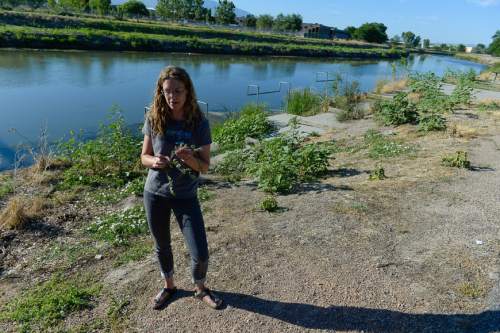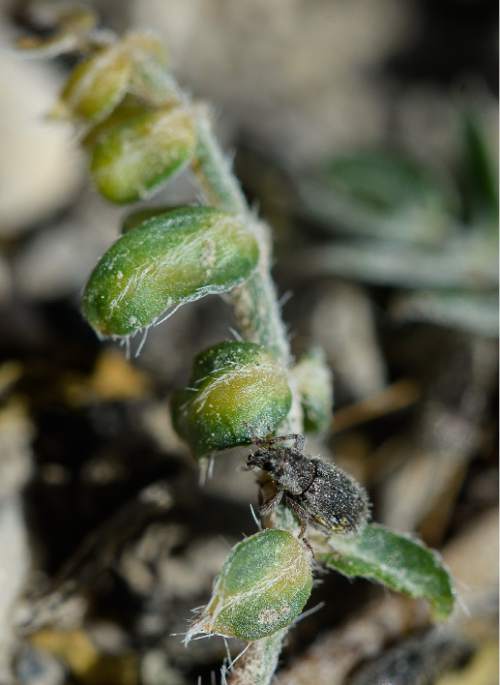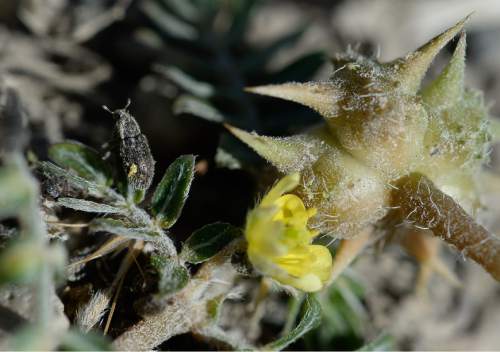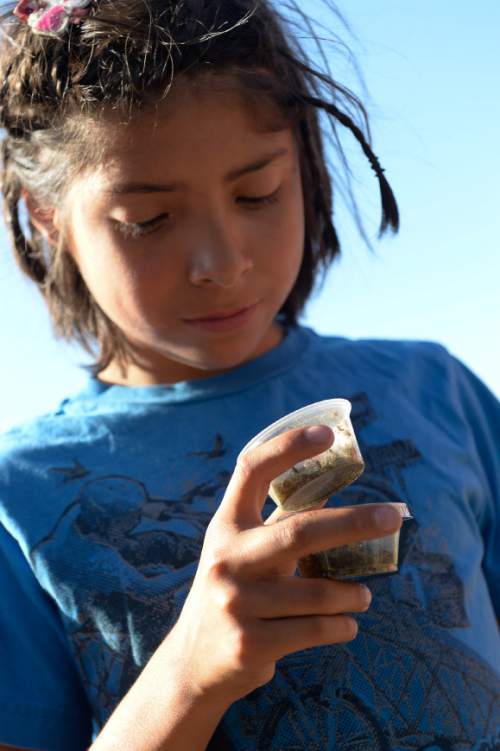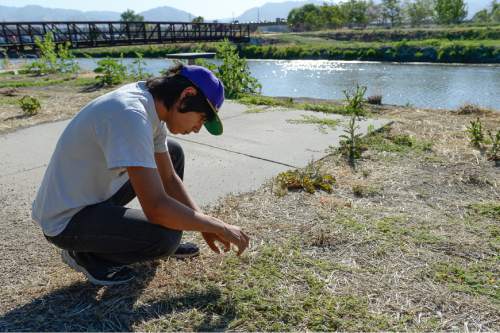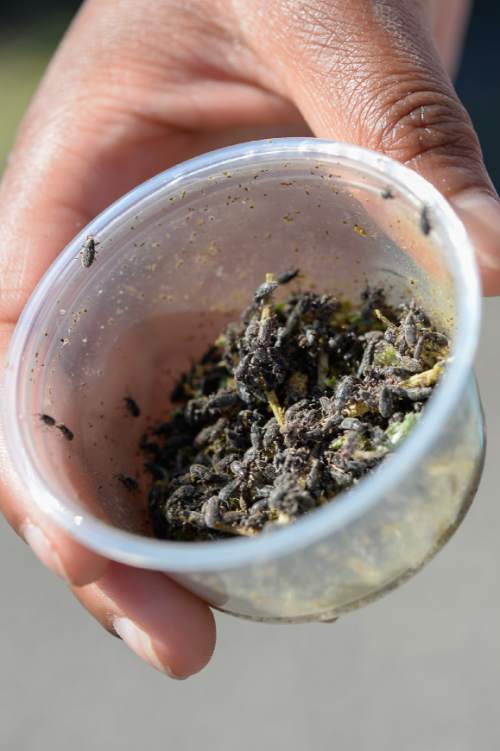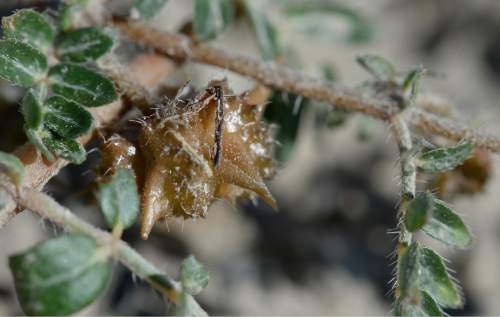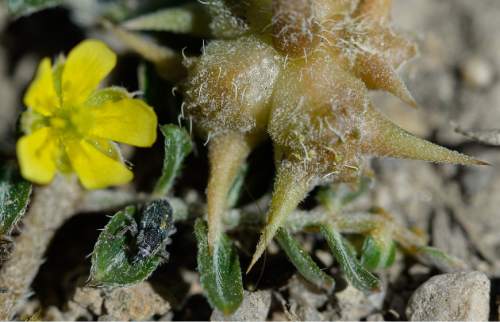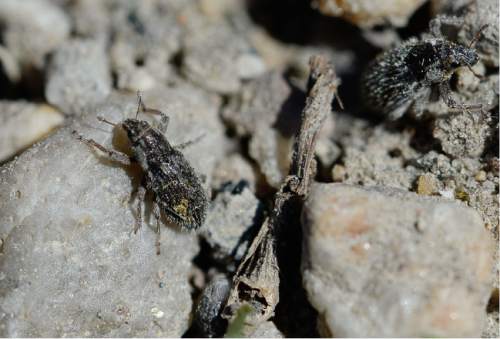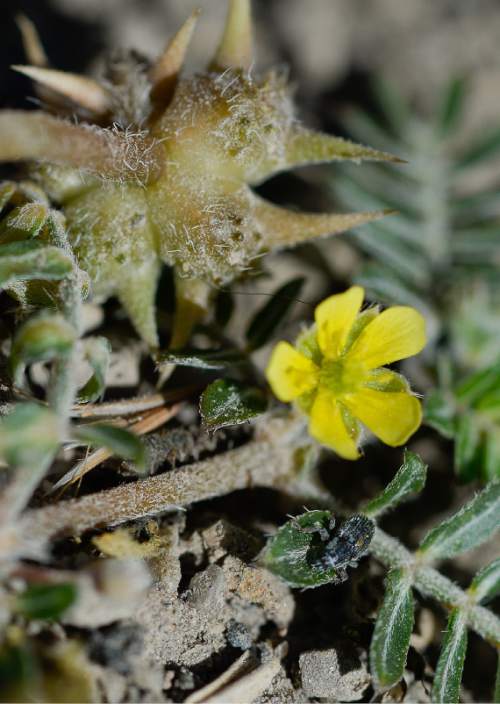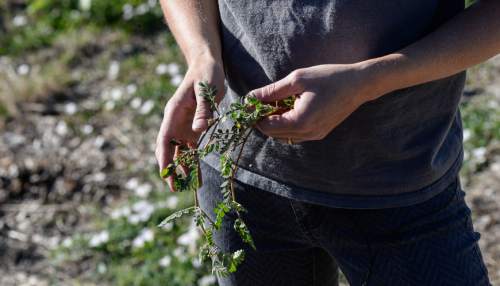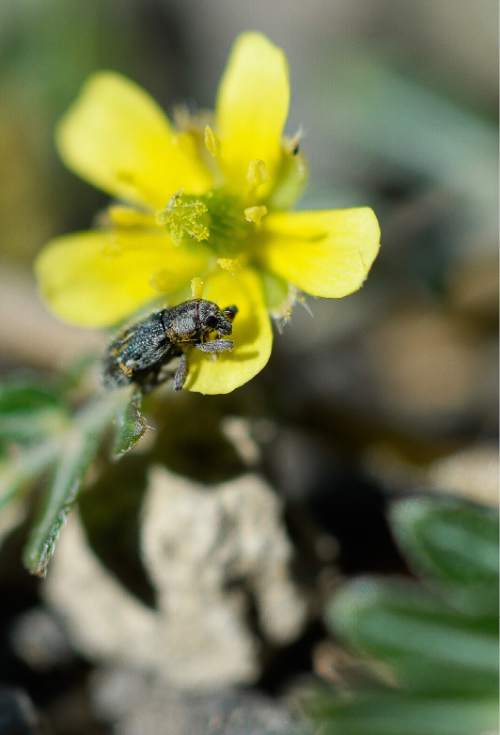Francisco Kjolseth | The Salt Lake Tribune
Laura Hanson, Executive Director of the Jordan River Commission holds a strand of punct
Francisco Kjolseth | The Salt Lake Tribune
Volunteers gather at the Redwood Trailhead Park in West Valley City to release 25,000 P
Francisco Kjolseth | The Salt Lake Tribune
Volunteers gather at the Redwood Trailhead Park in West Valley City to release 25,000 P
Francisco Kjolseth | The Salt Lake Tribune
Volunteer Ember Shearer Davis, 11, peeks in on the tiny Puncture Vine Weevils she was a
Francisco Kjolseth | The Salt Lake Tribune
Volunteer Ramiro Shearer Davis, 15, releases tiny Puncture Vine Weevils on the Jordan R
Francisco Kjolseth | The Salt Lake Tribune
Volunteer Ember Shearer Davis, 11, releases tiny Puncture Vine Weevils along the Jorda
Francisco Kjolseth | The Salt Lake Tribune
Volunteer brothers Patrick, 12, left, and Ramiro Shearer Davis, 15, releases tiny Punct
Francisco Kjolseth | The Salt Lake Tribune
Volunteers gather at the Redwood Trailhead Park in West Valley City to release 25,000 P
Francisco Kjolseth | The Salt Lake Tribune
Volunteers gather at the Redwood Trailhead Park in West Valley City to release 25,000 P
Francisco Kjolseth | The Salt Lake Tribune
Volunteers gather at the Redwood Trailhead Park in West Valley City to release 25,000 P
Francisco Kjolseth | The Salt Lake Tribune
Volunteers gather at the Redwood Trailhead Park in West Valley City to release 25,000 P
Francisco Kjolseth | The Salt Lake Tribune
Volunteers gather at the Redwood Trailhead Park in West Valley City to release 25,000 P
Francisco Kjolseth | The Salt Lake Tribune
Laura Hanson, Executive Director of the Jordan River Commission holds a strand of punct
Francisco Kjolseth | The Salt Lake Tribune
Volunteers gather at the Redwood Trailhead Park in West Valley City to release 25,000 P
Francisco Kjolseth | The Salt Lake Tribune
Laura Hanson, Executive Director of the Jordan River Commission holds a strand of puncture vine, the non-native invasive species that grows along the Jordan River. Approximately two thirds of the river has problems with the plant that produces a thorn that causes problems for bicyclists and animal paws.
Francisco Kjolseth | The Salt Lake Tribune
Volunteers gather at the Redwood Trailhead Park in West Valley City to release 25,000 Puncture Vine Weevils on the Jordan River trail in hopes of ridding the area of goatheads, the invasive weed with awful thorny barbs. The tiny bugs only eat the invasive species and are smaller than a lady bug.
Francisco Kjolseth | The Salt Lake Tribune
Volunteers gather at the Redwood Trailhead Park in West Valley City to release 25,000 Puncture Vine Weevils on the Jordan River trail in hopes of ridding the area of goatheads, the invasive weed with awful thorny barbs. The tiny bugs only eat the invasive species and are smaller than a lady bug.
Francisco Kjolseth | The Salt Lake Tribune
Volunteer Ember Shearer Davis, 11, peeks in on the tiny Puncture Vine Weevils she was about to release on the Jordan River trail in hopes of ridding the area of goatheads, the invasive weed with those awful thorny barbs.
Francisco Kjolseth | The Salt Lake Tribune
Volunteer Ramiro Shearer Davis, 15, releases tiny Puncture Vine Weevils on the Jordan River trail in hopes of ridding the area of goatheads, the invasive weed with those awful thorny barbs.
Francisco Kjolseth | The Salt Lake Tribune
Volunteer Ember Shearer Davis, 11, releases tiny Puncture Vine Weevils along the Jordan River trail in hopes of ridding the area of goatheads, the invasive weed with those awful thorny barbs.
Francisco Kjolseth | The Salt Lake Tribune
Volunteer brothers Patrick, 12, left, and Ramiro Shearer Davis, 15, releases tiny Puncture Vine Weevils on the Jordan River trail in hopes of ridding the area of goatheads, the invasive weed with those awful thorny barbs.
Francisco Kjolseth | The Salt Lake Tribune
Volunteers gather at the Redwood Trailhead Park in West Valley City to release 25,000 Puncture Vine Weevils on the Jordan River trail in hopes of ridding the area of goatheads, the invasive weed with awful thorny barbs. The tiny bugs only eat the invasive species and are smaller than a lady bug.
Francisco Kjolseth | The Salt Lake Tribune
Volunteers gather at the Redwood Trailhead Park in West Valley City to release 25,000 Puncture Vine Weevils on the Jordan River trail in hopes of ridding the area of goatheads, the invasive weed with awful thorny barbs. The tiny bugs only eat the invasive species and are smaller than a lady bug.
Francisco Kjolseth | The Salt Lake Tribune
Volunteers gather at the Redwood Trailhead Park in West Valley City to release 25,000 Puncture Vine Weevils on the Jordan River trail in hopes of ridding the area of goatheads, the invasive weed with awful thorny barbs. The tiny bugs only eat the invasive species and are smaller than a lady bug.
Francisco Kjolseth | The Salt Lake Tribune
Volunteers gather at the Redwood Trailhead Park in West Valley City to release 25,000 Puncture Vine Weevils on the Jordan River trail in hopes of ridding the area of goatheads, the invasive weed with awful thorny barbs. The tiny bugs only eat the invasive species and are smaller than a lady bug.
Francisco Kjolseth | The Salt Lake Tribune
Volunteers gather at the Redwood Trailhead Park in West Valley City to release 25,000 Puncture Vine Weevils on the Jordan River trail in hopes of ridding the area of goatheads, the invasive weed with awful thorny barbs. The tiny bugs only eat the invasive species and are smaller than a lady bug.
Francisco Kjolseth | The Salt Lake Tribune
Laura Hanson, Executive Director of the Jordan River Commission holds a strand of puncture vine, the non-native invasive species that grows along the Jordan River. Approximately two thirds of the river has problems with the plant that produces a thorn that causes problems for bicycle riders and animal paws.
Francisco Kjolseth | The Salt Lake Tribune
Volunteers gather at the Redwood Trailhead Park in West Valley City to release 25,000 Puncture Vine Weevils on the Jordan River trail in hopes of ridding the area of goatheads, the invasive weed with awful thorny barbs. The tiny bugs only eat the invasive species and are smaller than a lady bug.


